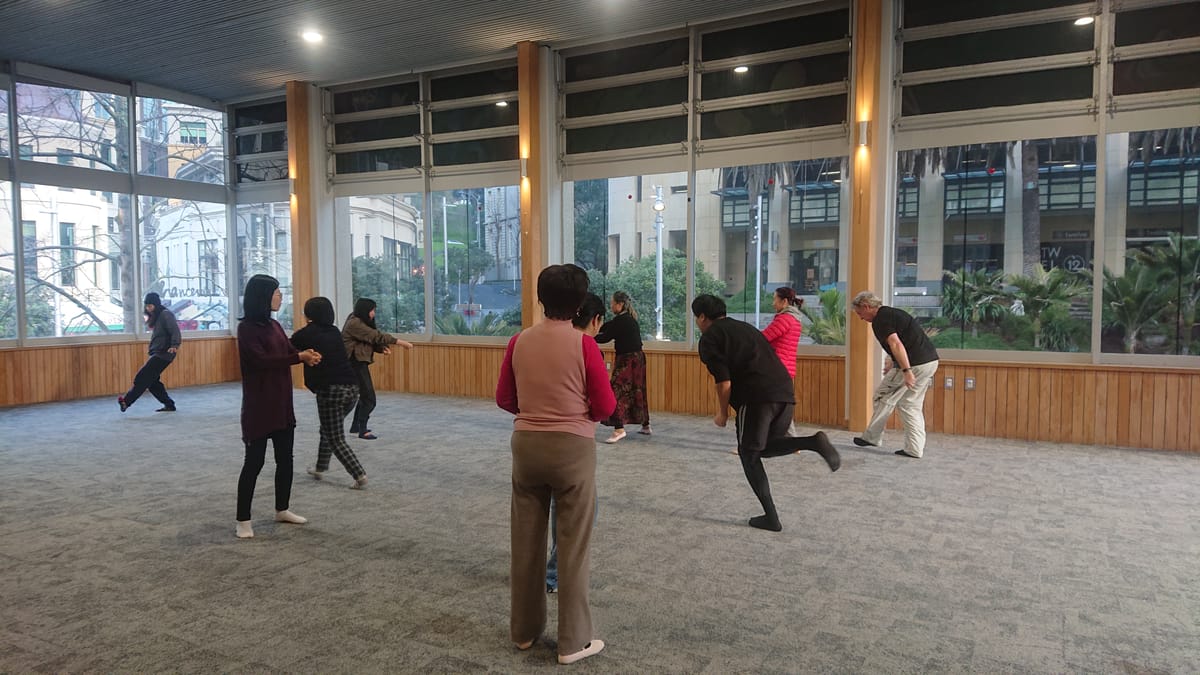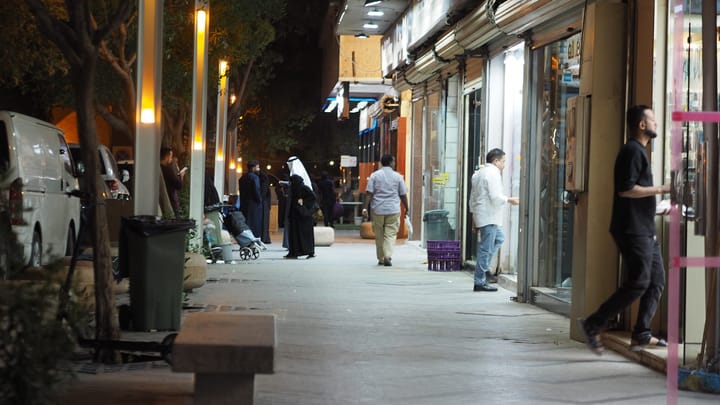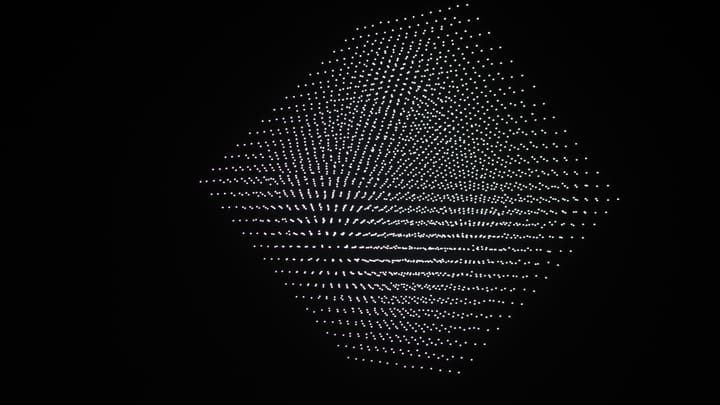Minus workshop 3 at EMC, or...

Chenby and I when we went upstairs to the auditorium at the Ellen Melville Centre where we conduct the workshops were met by Potato and Cindy as last week, now joined by Nancy, Jung a third, whose name escapes me, the ladies from the Chinese Dance Group which uses the space before us. Alex confided in me later that he, Chen and Chenby at dinner the previous week after the workshop had made a wager that this week Minus would be full of—they called them
Chinese Aunties
—five, in fact. He laughed. I asked Chen during the workshop how she was finding it.
It's surreal, she said, which is very Minus.
Yuka turned up at coffee break and Michael joined Kwan who was there from the start. The absentee husband? Who knows! A mystery, said Chen; they acted like good friends however it turns out Michael, a Kiwi, is visiting from Wellington. It sounded to me like they had met at the chat session held at Central Library so, recently.
Michael when asked to take part went, Why the hell not! I'm in Auckland, nobody knows me here. Anything goes.
When we got into thief, the extemporisations from stealing gestures off one who leads, and constructing scenes from there—we got into it by way of a direction to place a strong memory at a particular place in the working space, which is the whole room, speak it to yourself but out loud, in first language, to get used to your own voice, correct details which are incorrect, repeat until complete, and then find a gesture which summons the world of the strong memory. Then add gesture to words, still working alone, and find where it goes. Alex led with his strong memory, which was very striking.
He removed his face. It took effort, since it was stuck to him. He scrunched it up. He cast it down and he buried it.
When we got to thief, with the usual direction to find one clear gesture to steal and put it into your own body, find out how it fits—and if it is essentially Alex-ness—and start again either if it doesn't fit or is not Alex's, the new ones, Chinese Aunties, Michael and Kwan, made a joke of it. They were playing. Or they thought they were playing.
I said to Kwan lying on the floor laughing while the others buried her that being buried alive might not be such fun. And I have to note also that Yuka was meanwhile doing very interesting things, but alone. At the end I made a serious speech.
No cellphones. We are not playing. We will be dealing sometimes with painful and difficult things. We need to show respect to each other—even when or especially when we steal a gesture and give it a new meaning. For example, if Alex is not burying his former identity but digging a well or a hole to sit in, as in a Haruki Murakami novel.
I also mentioned a crystal tree, one of those trees that grows from paper soaked with a salt-saturated solution. How fragile they are. We have to proceed aware of the fragility of what we are building. (Of course even when, or especially when, smashing it to pieces.) Chen translated for the Chinese Aunties.
In the next thief session I noted because of the seriousness how everyone placed themselves at an equal distance from everyone else. We are working on the virtual image, on the energy that comes from imagination. I showed how energy is increased by connection across the space and by the strategic choice of being close. Alex leant back against my back. I fell over. He reached out his hand. That kind of thing... It was to introduce variation, but just as much to find that weapon I wrote about here:
... the work of imagination—the leaping flame. If we can ignite this, so people can see it and feel it, we would have a weapon.
Jung, Nancy and Michael—am I mistaken in thinking there were five Chinese Aunties?—did their life-stories. Jung was and is a beauty queen. She is soon to represent NZ in China. She paraded across the entire room, turned, returned, and then walked towards us and away.
The Chinese Aunties, before I forget, also performed a Tibetan dance for us. Jung moved beautifully, which is why I remember it at this point. Cindy's cellphone played the accompaniment. The constant cellphones... Something else I had seriously to address.
Michael's life-story had a stepping rhythm throughout. He made air-guitar moves. In a band? I asked. I play bass.
I have to think about how to guide the group towards weaponisation of the imagination. The Chinese Aunties will not be interested in that—a potential way in was indicated by Potato's life-story which dramatised the 800 year-old tree, the falling leaves, the concrete symbolic of stretches of time, all from Classical Chinese Poetry. Using literature suggests itself as a way to raise the level of interest and its intensity in participating for the Chinese Aunties.
Another way, or one reinforcing what we are already doing, came from Manon yesterday. She said I should watch Hong Sang-soo's A Traveler’s Needs, 2024, and briefly related the story, how Isabelle Huppert's character, a French teacher in Korea, has her own method of teaching her students one-on-one. She asks them to tell her a story of emotional significance for them and translates that into French. They then learn the French version until they can tell their story in French. Instead of French, let's say, using the language of theatre.
Would we then provide a translation for each member to learn, for the new Minuses, specifically, and the Chinese Aunties? Until they were fluent in the language of theatre?
I picked up Loren Eiseley's The Night Country, 1971, this morning. After the Golden Wheels, second story in, he begins with the image of a house that has a cellar with a monster in it.
There was he says no monster, but something that felt like it was.
something that felt like it was
Having memory, duration and presence, it's a good title for a Minus performance.
What I'm thinking of is leading the Minuses one by one down the cellar steps to where the monster is but equally where there is no monster, only something that felt like it was.
This in turn suggests making a narrative structure out of something like the Elizabethan Game: elements of the Elizabethan Game take psychological 'stations' for points articulating the narrative:
- describe your home (this is like the essence of Alex-ness discussed above)
- describe the surroundings, trees?
- you leave the house, describe the path, a gate? a fence or wall?
- you come to a road, describe it.
- you find a key, describe it. What do you do with it?
- you find a bowl, describe it. What do you do with it?
- you come to water, describe it. You cross it, how?
- you come to a barrier, describe it.
Either that or—a crystal tree.


